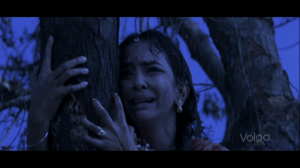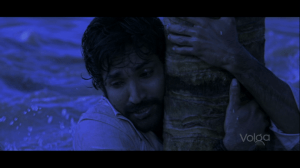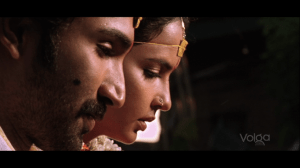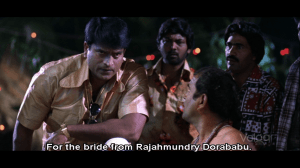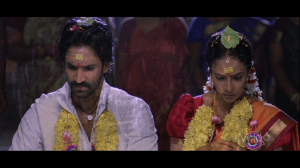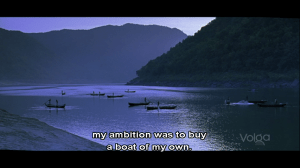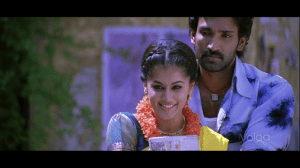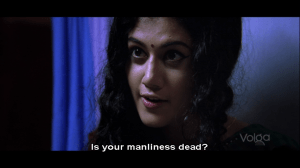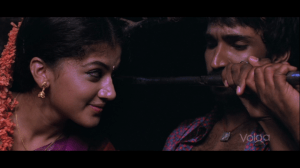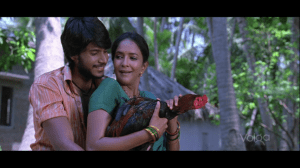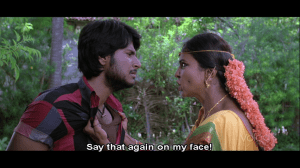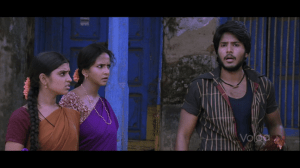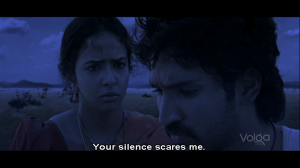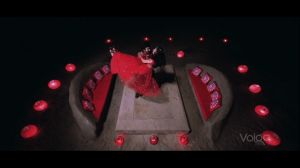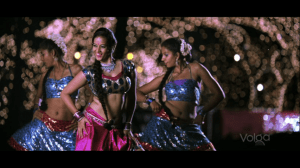Gundello Godari is a step away from mass masala, going back to basics with a simple love story that evolves in quite a different way from the usual fare. This is director Kumar Nagendra’s debut film and it’s loosely based on a novel by BVS Rama Rao, set around the real-life devastating floods in 1986. Initially, newlyweds Malli and Chitra know nothing about each other, but as they battle through the Godavari floodwaters, they gradually learn about their respective troubled pasts. The screenplay is a little patchy in places and the flood is frequently overly melodramatic, but good performances and beautiful music by Ilaiyaraaja make this a better than average watch.
The story opens with the marriage of Malli (Aadhi) and Chitra (Lakshmi Manchu), although they barely acknowledge each other throughout the ceremony. The first spark of interest occurs when the beautiful Sarala (Taapsee Pannu) gifts the groom with a golden ring, obviously with the intention of making his new bride jealous. At that point, the sleazy Dhorababu (Ravi Babu) arrives and also has a present for the happy couple, this time a gold chain for the bride. Lost in their thoughts, Chitra and Malli linger too long and get caught up in the flood waters as the rest of the village evacuates. However, they end up cast adrift on a thatched roof together, just managing to stay afloat, and in the likelihood that they won’t survive, decide to discuss their past lives and exactly how Sarala and Dhorababu fit into the picture.
The initial flood scenes are well integrated between the sets and some good CGI. There are one or two moments of soggy model villages eroding with a trickle of water, but these are brief, and after all, who doesn’t like to see the traditional model village make an appearance. The cinematography by M.R.Palanikumaar is excellent, with beautiful shots of the river, wildlife and surrounding countryside particularly during the flashback scenes. These contrast with the fury of the river in full flood, and also highlight the difference between Malli and Chitra’s earlier lives and their current turmoil. Predictable perhaps, but when the parallels are drawn this well with good imagery it’s hard to object.
The first flashback deals with Malli and his undoing at the hands of his boss’s daughter. Malli is a hard-working fisherman who has a good circle of friends, looks after his mother like all good boys should, and is saving up to buy his own boat. He also tends to favour a string vest, but we shouldn’t hold that against him.
Kumar Nagendra captures the hopes and aspirations of a village fisherman perfectly and Aadhi is excellent in the role. A boat race at a local fair epitomises Malli’s drive and determination to achieve what he wants, although the same fair brings him inadvertently to the attention of Sarala. Despite her impending marriage, Sarala has no compunction in going after what she wants, and in this case what she wants is Malli! Although she initially appears child-like as she threatens and cajoles Malli into taking her to the movies on her birthday, events become more sinister as Malli arrested by the local police on a spurious charge of brewing illicit alcohol. Whether it’s Sarala or her father who is responsible, Malli ends up taking his frustration out on Sarala and gives her exactly what she wants in the process. Sarala is an interesting and atypical character with her overt sexuality and brazen attempts to drag Malli into her bed. Taapsee is good in the role, but her expression rarely varies, and although her knowing smirk is suitable a little more variation would have given her character more appeal. Aadhi on the other hand does a fantastic job of capturing frustration, anger and even some lust in his dealings with Sarala and despite the nature of their relationship, there is plenty of emotion and sparkage between the two characters.
After Malli’s story, Chitra’s explanation of past events is not as well written and her story tends to wander off track. Chitra was adopted by Suri’s (Sundeep Kishan) parents as a child, but it’s not a happy family. Suri’s father Somaiah is a drunkard and his mother Rathamma works as a prostitute to keep the wolf from the door. Chitra is in love with the adult Suri, but he’s a man more interested in his chickens, in particular fighting cocks, than in Chitra. He also pays a little too much attention to the bangle seller Bangari (Suja Varunee) and all together there seems very little reason for Chitra to want to marry Suri.
It’s actually a little creepy since they were brought up together as brother and sister, but since there is minimal chemistry between the two actors this isn’t a major issue. Sundeep Kishan is restrained but adequate in his role as Suri, and the character doesn’t have a lot of depth for Sundeep to work with. The explanation for Dhorababu turning up at the wedding is also less convincing, but Lakshmi Manchu is good as the beleaguered Chitra, and her spirited defiance against the various calamities that befall her is heartening.
While the flashback sequences provide some explanation of previous events, they do provoke more questions that are never answered. There is no explanation of what happened to Malli after his interaction with Sarala, and more importantly no mention of whether or not he is working as a fisherman and able to support a wife given his previous dismissal by his erstwhile boss. The arrangement of the wedding is never discussed and there is no reason given for these two strangers deciding to marry each other. Still, the developing relationship between the two is well handled, even though it is almost swamped at times by the drama of the flood, and both Aadhi and Laksmi Manchu are both very good in their respective roles.
Ilaiyaraaja’s music is evocative of the time, although there are two rather oddly placed item numbers which don’t fit as well and don’t have any real place in the narrative. Mumaith Khan features in one of these, while Suja Varunee does the honours in the second, but both feel as if they are just added in to try and appeal to a more mass audience and aren’t particularly well choreographed. However, apart from the first song, these are the only two numbers which feature any dancing, since the rest are used to showcase the various relationships of the main characters.
Gundello Godari is a brave attempt to take a different look at relationships and approach a love story in a more unusual way. For the most part it works, although the second half could be tighter condensed to allow for a more detailed development of the relationship between the two main leads. Worth watching for evocative imagery, good performances from Aadhi and Lakshmi Manchu and a bold characterisation from Taapsee. 3½ stars.



